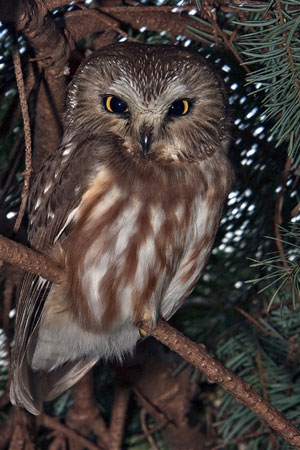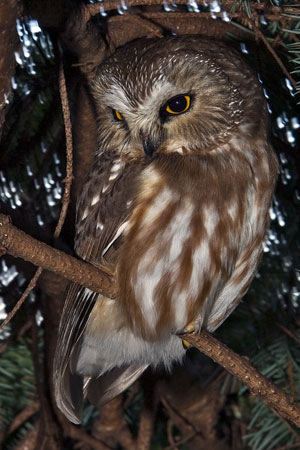
Home | About Us | Projects | Maps | Facts

Home | About Us | Projects | Maps | Facts
|
Northern Saw-whet Owl (Aegolius acadicus) Description: The Northern Saw-whet Owl is a small short-bodied owl with a short tail. The large rounded head has no ear tufts. The face is light brown, outlined in dark brown and white streaks. They have brown-and-white striped chests and bellies. Their large eyes are yellow. The white eyebrows connect in a 'Y' over their beaks. Like other raptors they have strong grasping talons for killing prey, and a hooked upper beak for tearing meat.
The Saw-whet Owl's name comes from the "skiew" call that is made when alarmed. This sound has a resemblance to the whetting of a saw. The male and female display similar plumage, but females are larger. 
Call: Song is a series of whistled toots. Listen to calls of this species » Range / Habitat: This owl breeds from southern Alaska eastward to Nova Scotia, southward to northern United States, and further southward in mountains. They winter throughout the breeding range, and southward across the United States. Northern Saw-whet Owls inhabit all forest types in Washington state. Click the range map to learn more about the distribution of Northern Saw-whet Owls in Washington. Diet: Northern Saw-whet Owls eat deer mice. They also eat shrews, voles, young squirrels, small birds, and large insects. 
Nesting: Northern Saw-whet Owl males choose and defend territories and call to attract females. The females choose the nest cavity, often an old nest hole made by a Northern Flicker or Pileated Woodpecker. The female Northern Saw-whet Owl does the incubation and brooding. The male brings all the food needed while the female is incubating the eggs. She leaves the eggs for only one or two short trips each night, to defecate and cough up a pellet. (BirdWeb) The incubation period is 21 to 28 days. Young fledge at 4 to 5 weeks, and may leave the nest individually every 1 to 2 days, until they have all left. The young owls are cared for by the parents for some weeks after they leave the nest.
Behavior: Northern Saw-whet Owls are strictly Nocturnal, with activity beginning at late dusk. The Northern Saw-whet Owl has excellent low-light vision, and can easily find prey at night by sight. Its defense upon discovery is to sit still and not fly. This behavior can lead people to perceive these owls as "tame." Did you know?
More information: Animal silhouettes available to purchase » Photos: Natures Pics |